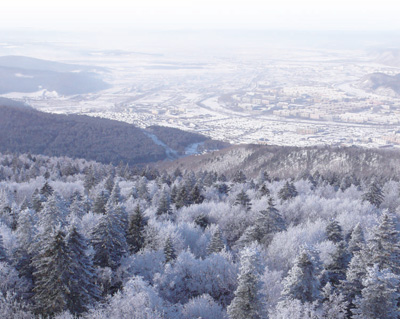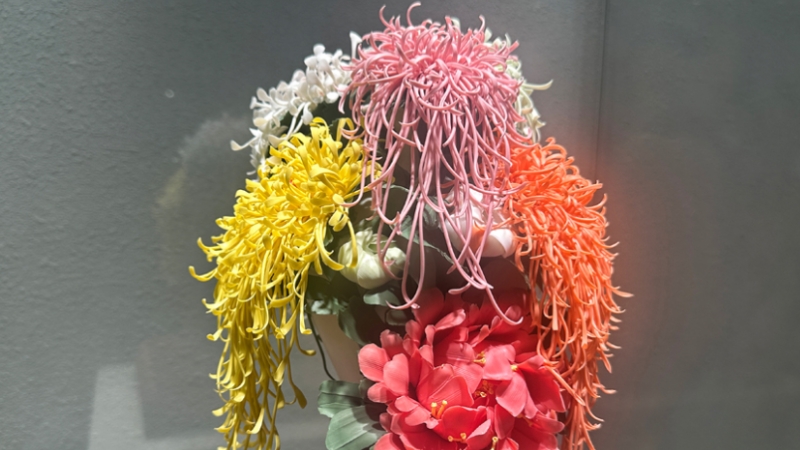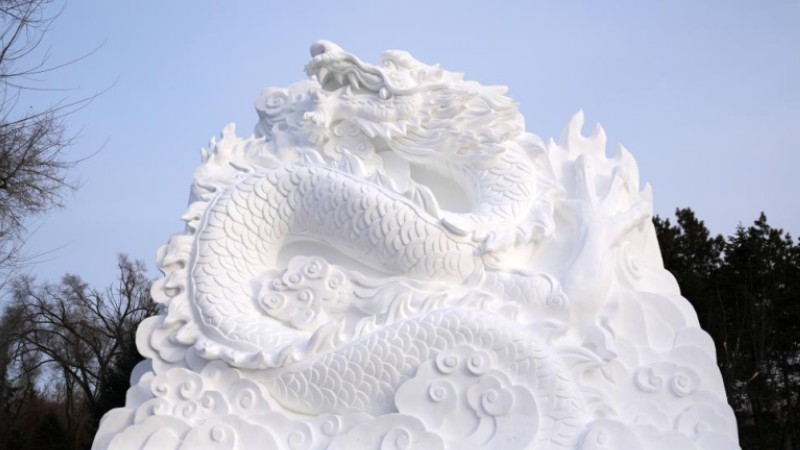Yichun in NE China blazes new path of green development
Yichun city in northeast China's Heilongjiang Province has blazed a new path of prioritizing ecology and green development by strengthening ecological protection and restoring and boosting tourism.
With a forest coverage rate of 83.8 percent, Yichun is a key state-owned forest area and is home to the largest and best-preserved natural red pines in Asia.

Photo shows a view of the Xing'an National Forest Park in Yichun city, northeast China's Heilongjiang Province. (Photo courtesy of the publicity department of the Communist Party of China Yichun municipal committee)
“In the past, when winter approached, Yichun seemed like a large wood processing plant," said Liu Yangshun, who used to work as a logger at the Xishui forest farm in the city and now runs an agritainment business.
Yichun has a history of more than 60 years of forest exploitation. During this period, the city supplied 270 million cubic meters of quality timber to China. The figure accounted for around one-fifth of the total supply of state-owned forests nationwide over the same period.
Due to excessive logging, the city was named by the State Council as one of the first batch of 12 resource-exhausted cities in 2008.
In 2013, Yichun took the lead among key state-owned forest areas in completely banning commercial logging in natural forests and actively promoted the restoration of the forest ecology.
"Since 2019, our forest farm has planted nearly 480,000 trees," said Qin Ruiliang, Party branch secretary of the Xishui forest farm branch of the Shangganling forest bureau under Heilongjiang Yichun Forest Industry Group Co., Ltd.
"Traditionally, red pine seedlings need four years of nursery before planting and the seedlings can be planted in less than a month in spring. With light substrate, the nursery period is reduced to two years and two months, and we can plant seedlings in spring, summer and autumn," Qin said.
The group has established 12 light substrate nursery bases, including the Xishui forest farm, producing 252 million seedlings.
Since the beginning of this year, Yichun has planted 199,700 mu (13,313 hectares) of forests, with the average annual forest stock volume increasing by over 10 million cubic meters for 10 consecutive years.
In addition, Yichun has also taken holistic measures to protect the ecosystem.
The group's digital command center has set up a monitoring system consisting of satellite data, planes, drones, watchtowers, remote cameras, and forest rangers to support forest fire prevention.
The group has also built a "three-tier" forest chief system for the management and protection of forests.
"We strictly implement the forest chief system," Qin said, explaining that 23 rangers are responsible for the Xishui forest farm.
Yichun has put 15,000 square kilometers, or 46.4 percent of its territorial area, under ecological conservation red lines, and established 23 natural reserves covering 670,000 hectares at different levels.
In recent years, Yichun has fully leveraged its advantages in the integrated development of forests, ice-snow resources, ethnic customs, and hot springs to boost ice-snow tourism and eco-tourism.
Eco-tourism has become increasingly popular in Yichun. During this year's Mid-Autumn Festival and National Day holiday, Yichun received 935,000 domestic tourist visits, with tourism revenue reaching 680 million yuan (about $95.8 million), ranking among the most popular tourist cities in Heilongjiang Province.
This winter, Yichun plans to create an alluring ice and snow tourism season for tourists by integrating elements such as rime, health and wellness, skiing, study tours, ethnic customs and cuisine.
"Nearly 2,000 study tour visits have been booked for winter this year, with projected winter tourism revenue hitting 3 million yuan,” said Liu Jun, who is in charge of an ecotourism project in Yichun.
Photos
Related Stories
- Ecological restoration of Chagan Lake in NE China brings bright fishery, eco-tourism prospects
- In numbers: achievements in ecological protection of Yellow River basin in E China's Shandong
- Zhangye in NW China's Gansu continues to bolster ecological protection, green development
- BRI has a green thumb vis-a-vis development
- Mt. Cho Oyu expedition conducive to Tibet's ecological protection
- County in E China's Anhui explores new ways to turn ecological resources into valuable assets
- More national parks urged to protect species
- China's globally shared wisdom in sand control a microcosm of ecological civilization construction: former Polish president
Copyright © 2023 People's Daily Online. All Rights Reserved.









